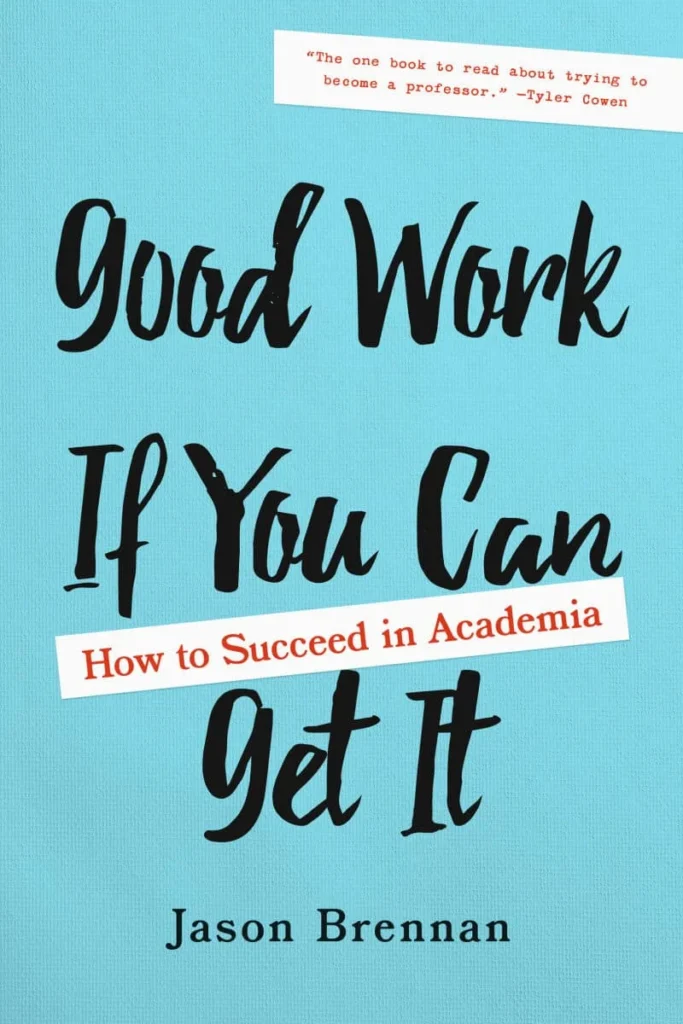I recently read a very nice book that I cannot recommend highly enough:

“Good Work If You Can Get It. How to Succeed in Academia” by Jason Brennan (2020)
It’s written in a witty and funny style but very realistic. The reality behind the academic training programmes (aka the graduate schools) is grim: almost “80,000 students will begin pursuing a PhD this year alone. But while almost all of new PhD students say they want to work in academia, most are destined for disappointment. The hard truth is that half will quit or fail to get their degree, and most graduates will never find a full-time academic job.” In reality, graduate schools train PhDs to become professors and academics doing research, but only a tiny percentage of them get to be that. The book is about how to increase one’s chances of becoming a tenured professor, already from the PhD school stage, with a lot of helpful advice and sobering remarks about the riskiness of the entire situation. I cannot recommend this book highly enough, and I credit my colleague, Michael K., for recommending this to me.
But what interests me here are Brennan’s remarks about academic writing and publishing strategies. Some quotes:
- “I suggested that he rewrite his abstract. The goal: Try to explain your research in a way that’s so interesting that your hairdresser would want to read it.”
- “Most academics don’t learn how to sell what they do. If you haven’t, I’m not blaming you. You may simply be copying how others in the field write. Most academics are boring, flat writers. To be clear: They succeeded despite their bad writing, not because of it.”
- “there’s always a problem: your teachers and professors were paid to read your work. They generally read all of it. In the real world, though, including academia, people aren’t getting paid to read your work, even when they’re getting paid to read some work.”
- “Your research is competing with Game of Thrones, drinking craft beer, playing tennis, taking a nap, prepping classes, chatting with co-workers, revising the reader’s own research, and reading all the other research out there.”
- “Aim for a twelfth-grade reading level or lower. Cut fifty words from each page of your writing sample. Read every paper out loud. If it doesn’t flow, rewrite it. (…) These tips won’t make you come across as less sophisticated. On the contrary, anyone with a thesaurus can write in a convoluted, ornate way. Anyone can hide a half-baked idea behind vague, opaque prose that creates the illusion of profundity. To be able to explain a profound and complicated idea— say, quantum mechanics—in plain and simple English requires genuine talent. You can’t fake that around experts. It proves you’re smart. (…) Further, forcing yourself to write in simple language often reveals to you where the gaps in your argument are. Sometimes your argument only seems airtight because even you don’t understand what you really mean.”
- “Tortured writing is easy. Writing that seems effortless takes real skill.”
This advice to write simple, straightforward and exciting texts is timeless, but even more so today. Brennan’s book was published in 2020, before LLMs. What we are facing now in academic publications is a flood of half-human, half-LLMs written texts. We recognise them easily by the flood of meaningless and inflated words that simulate sophistication: the research underscores, highlights, emphasises the importance of…. etc. This research is crucial and important and [insert inflated advertising words here]. All these texts feel like chewing cardboard when reading. The authors have nothing vital to say, and neither does the poor LLM used to put that nothingness in many words. And if this nothing inflated with words (like puffed cereals) used to require some effort before, now it is incredibly cheap to produce.
Because of this trend, journals in the humanities and social sciences, and maybe down the line, the natural sciences, will demand that the papers are clear, sharp and interestingly written. Even with style! So, while Brennan’s advice on writing is for researchers aiming to shine out of a crowd of dull writers (and most academics do write boringly; it’s like an unwritten norm), things will change soon. We will write stylishly to survive the publication process. Academic training will then include these skills by default, and people will get an education in stylish and exciting writing. We just need to ensure that all PhD programmes get this kind of training baked into them so that we don’t create new social rifts between the wealthy and the rest.
Writing witty, interesting prose used to be the mark of an elite education that only few could dream of – Oxford, Cambridge, Harvard, etc. Now, it can no longer be this. We need to democratise and refine the creative writing skills. There is no other way forward from the LLM universe.
“Tortured writing is easy.” LLMs write so boringly and soulless because academics have been writing tortured texts for decades, maybe even centuries. LLMs learned from most texts published in journals, and our texts have been boring as hell. We need to switch the style and upskill our writing game, or else, if writing academic texts is boring, tortured, cardboard-like prose, any AI can replace us, and maybe it should replace us. It used to be “publish or perish”, it will be soon “upskill your writing game or perish”.

Leave a Reply